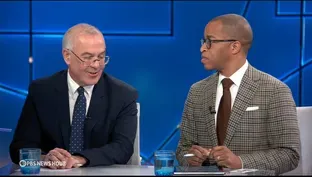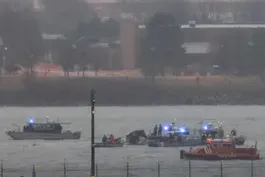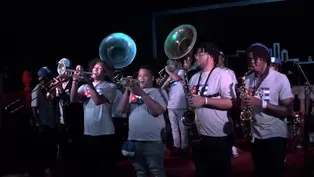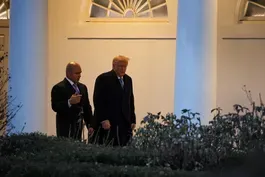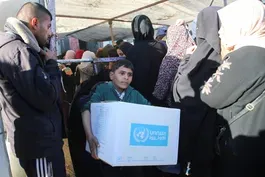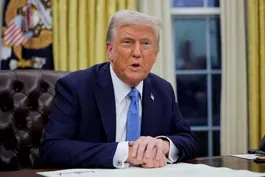
Syrian revolutionary describes his vision for rebuilding
Clip: 1/31/2025 | 7m 28sVideo has Closed Captions
Syrian revolutionary describes his vision for rebuilding after 13 years of civil war
As Syria recovers from 13 years of civil war and five decades under the Assad regime, its citizens face the daunting task of rebuilding their nation. Saleh Hawa, a Syrian literature professor and revolutionary, saw his hometown bombed heavily during the war. Now he says there's an opportunity for the West to make up for its lack of support. Special correspondent Leila Molana-Allen reports.
Major corporate funding for the PBS News Hour is provided by BDO, BNSF, Consumer Cellular, American Cruise Lines, and Raymond James. Funding for the PBS NewsHour Weekend is provided by...

Syrian revolutionary describes his vision for rebuilding
Clip: 1/31/2025 | 7m 28sVideo has Closed Captions
As Syria recovers from 13 years of civil war and five decades under the Assad regime, its citizens face the daunting task of rebuilding their nation. Saleh Hawa, a Syrian literature professor and revolutionary, saw his hometown bombed heavily during the war. Now he says there's an opportunity for the West to make up for its lack of support. Special correspondent Leila Molana-Allen reports.
How to Watch PBS News Hour
PBS News Hour is available to stream on pbs.org and the free PBS App, available on iPhone, Apple TV, Android TV, Android smartphones, Amazon Fire TV, Amazon Fire Tablet, Roku, Samsung Smart TV, and Vizio.
Providing Support for PBS.org
Learn Moreabout PBS online sponsorshipGEOFF BENNETT: As Syria recovers from 13 years of civil war and decades under the brutal Assad regime, its people must now rebuild their nation.
AMNA NAWAZ: One of those facing that task is Saleh Hawa, a Syrian literature professor and revolutionary who the "News Hour" met in 2012 and has spoken with many times since.
Special correspondent Leila Molana-Allen spoke with him recently in the new free Syria.
LEILA MOLANA-ALLEN: A free Syria for all its people.
In 2012, Saleh Hawa was an idealistic young father, teacher and protester, with high hopes for a free future for his country.
SALEH HAWA, Syrian Professor and Activist: We're singing, we're chanting in the streets peacefully without carrying any weapons.
Every day, the Assad regime forces, the security, the Mukhabarat forces kill people on a daily basis.
LEILA MOLANA-ALLEN: What he saw in the 12 years since left him dejected and hopeless, his hometown of Haritan devastated by Russian airstrikes, and hundreds of his friends and colleagues killed and displaced.
This was once Saleh's home, where he raised his three oldest children and dreamed of a bright future for them.
Now his community, like thousands across the country, lies in pieces.
The earthquake two years ago took much of what the warplanes and artillery shells hadn't already destroyed.
Saleh still thinks much death and destruction could have been avoided if he and his friends were given the help they needed in the early days of the revolution.
SALEH HAWA: Nobody needs to blame them for being militants, because what they saw pushes everybody to be militant, when you see that all the people around you are bombed every day, and nobody is trying to help.
We do not deny that we got good support from Western governments and Western organizations.
But everything they gave was food, some blanket, but what we needed at that time was some kind of weaponry.
If the U.S. at that time had supported us militarily, we would have prevented Iran from smuggling weapons to Hezbollah.
LEILA MOLANA-ALLEN: Saleh, who once believed the world, and especially the U.S., would stand behind Syrian protesters, spoke multiple times to the "News Hour" as the civil war spiralled, telling us his country had been abandoned to horror.
But, he says, now is their chance to make amends.
He fears, if there's a power vacuum, Iran and Russia could come back to fill it.
SALEH HAWA: Particularly the West, particularly America, right now have, let me say, a very good chance to start a new page with the Syrian people, to atone for their sins with the Syrian people.
They let us down in the past.
I believe that pro-Assad forces are still waiting, they are still weaponized, and lots of Iranians are still in Syria, by the way.
This means that right now the West mustn't lose this chance.
LEILA MOLANA-ALLEN: After the sudden fall of the dictator who he says destroyed his country, now Saleh's hope is back, rejoicing alongside millions of Syrians at home and displaced abroad who now hope to return.
But so many like him have been left homeless and penniless by this war, and his family is luckier than most.
Since fleeing Haritan, they have been living in this small house in Azaz that the whole extended family shares.
Rebuilding will be an almighty task in a country with an economy that's in ruins too.
SALEH HAWA: Eighty percent of our houses had been destroyed by the Russian airplanes.
I cannot rebuild my house because it needs thousands of dollars, and you know this is impossible nowadays because we do not have salaries.
The economic cycle right now has broken down.
The economic situation needs to be reactivated, needs to be starting new businesses, starting factories, because we have lots of young men here are unemployed.
LEILA MOLANA-ALLEN: When rebel-held Idlib faced extermination in 2020, Saleh begged then-President Trump for help.
SALEH HAWA: I'm calling for President Mr. Donald Trump, please do something, please.
I beg you.
LEILA MOLANA-ALLEN: Now he has high hopes that a Trump presidency will be in Syria's favor, mostly because of his firm stance against Iran.
SALEH HAWA: The nuclear agreement was under the Obama administration, and Mr. Trump stopped all that agreement.
That's why we as Syrians believe that, if we think of who is better for Syria in terms of the relationship with Iran, no, it's -- definitely, it's President Trump.
Even if we are not his friends, at least he is an enemy of our enemy.
LEILA MOLANA-ALLEN: Since 2016, Saleh has been teaching at what people in rebel-held territory called the University of Free Aleppo.
A literature professor, now he hopes his future will be dominated by books, not war.
SALEH HAWA: I feel that I am still in a dream.
The tyrannical regime, the dictator whom we worked hard to topple down for 13 years right now is erased from Syria in 13 days.
That was miraculous.
I believe that this is the first time we as Syrian people and, personally, I feel that I am a human being again.
I am free again.
All of us believe that we were born just now.
We have been born maybe for the first time in our life.
We can speak freely.
LEILA MOLANA-ALLEN: There's so much work to be done.
But when and if you get there, what does life in a free Syria look like for you?
SALEH HAWA: As revolutionaries, we don't think about ourselves.
We think about our society, about the benefits of our society, the welfare of our society.
And that's why we started the revolution, because we wanted to liberate our society, to open new horizons for the generations to come.
Imagine, after 13 years of being chased from one place to the other, displaced outside my home and living under bombardment, waiting for the Russian planes to come and attack us, the ideas, the feelings, the emotions are crowded in our heads, and not knowing what to do, what to say, how to feel even.
So I cannot imagine how my future life will be.
LEILA MOLANA-ALLEN: And how about for your kids?
You grew up under the Assads.
What do you want for them?
SALEH HAWA: At least we got rid of the Assad regime and we let them live freely now.
They can say what they want.
They can feel what they want.
They can speak freely.
Now they are not afraid of any oppression.
They are not afraid to be detained anymore.
And I believe that the future is ahead of them.
LEILA MOLANA-ALLEN: A future he never thought they would see.
Now he hopes he and his countrymen can build the nation they promised.
For the "PBS News Hour," I'm Leila Molana-Allen in Aleppo, Syria.
Brooks and Capehart on Trump's tariffs and spending freeze
Video has Closed Captions
Brooks and Capehart on Trump's new tariffs and spending freeze chaos (9m 53s)
Helicopters restricted near D.C. airport after collision
Video has Closed Captions
Helicopter flights heavily restricted near Washington airport after midair collision (8m 4s)
Musicians work to forge relations between U.S. and Cuba
Video has Closed Captions
Musicians use their art as a gateway to better relations between the U.S. and Cuba (10m)
News Wrap: Judge blocks Trump's plans to freeze grants
Video has Closed Captions
News Wrap: Judge blocks Trump's plans to freeze federal grants and loans until Monday (5m 17s)
UNRWA vows to keep providing aid to Gaza despite Israeli ban
Video has Closed Captions
UNRWA vows to keep providing aid to Gaza despite Israeli ban (7m 57s)
What we know about Trump's tariffs on Mexico, Canada, China
Video has Closed Captions
What we know about Trump's plan to slap tariffs on Mexico, Canada and China (3m 24s)
Providing Support for PBS.org
Learn Moreabout PBS online sponsorshipMajor corporate funding for the PBS News Hour is provided by BDO, BNSF, Consumer Cellular, American Cruise Lines, and Raymond James. Funding for the PBS NewsHour Weekend is provided by...

